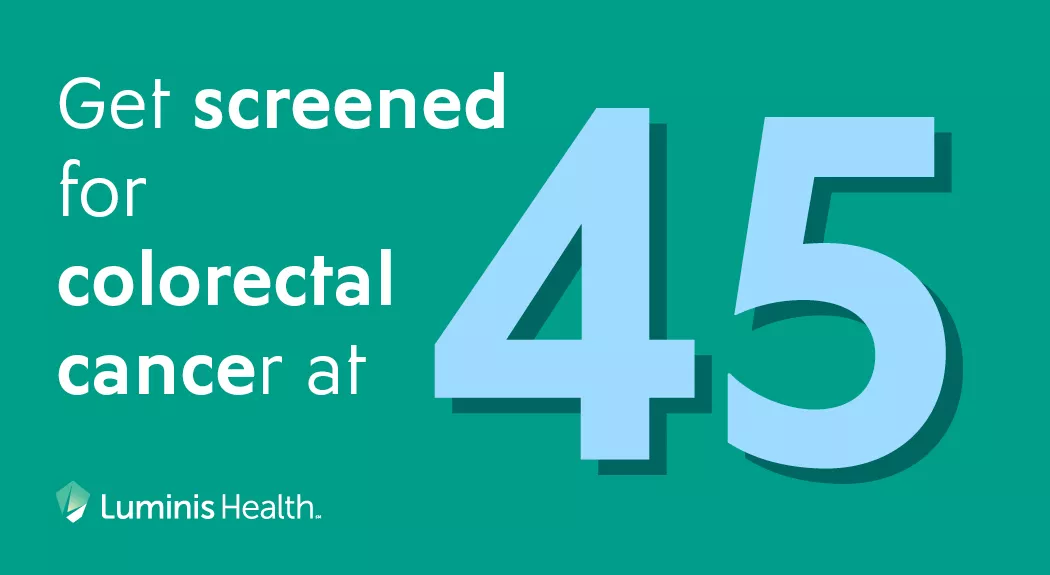by Luminis Health

There’s good news and bad news when it comes to colorectal cancer. More people are surviving colon and rectal cancer, but adults are being diagnosed at younger ages, which is alarming. According to a just-released American Cancer Society report, one in five new cases are among people in their early 50s or younger. There also appears to be an overall shift to more diagnoses of advanced stages of cancer.
Screenings are important because colorectal cancer is the second most common cause of cancer death in the United States, and it is the leading cause of cancer-related deaths in men younger than 50. If you are at average risk, it is now recommended that you start screening at age 45. Getting a colonoscopy is not exactly fun, but there are now more convenient options.
Types of Colorectal Screening Tests
Several screening tests can be used to find polyps or colorectal cancer. These tests can be divided into two main groups, each with different risks and benefits:
Stool-based tests: These tests check the stool for signs of cancer. These tests are less invasive and easier to have done, but they need to be done more often.
Visual (structural) exams: These tests look at the structure of the colon and rectum for any abnormal areas. This is done either with a scope (a tube-like instrument with a light and tiny video camera on the end) put into the rectum, or with special imaging (x-ray) tests.
Stool-based Tests
Stool-based tests are typically done at home, so many people find them easier than a colonoscopy. But, although these tests are easier to implement, they need to be done more often. If the result from a stool test is abnormal, a timely colonoscopy is required to check for cancer.
The guaiac-based fecal occult blood test (gFOBT) uses the chemical guaiac to detect blood in the stool. It is done once a year and requires a test kit that is received from your healthcare provider. At home, you use a stick or brush to obtain a small amount of stool, which is then returned in the test kit to the doctor or a lab where the stool samples are checked for the presence of blood.
The fecal immunochemical test (FIT) uses antibodies to detect blood in the stool. It is also done once a year in the same way as a gFOBT.
The FIT-DNA test (also referred to as the stool DNA test) combines the FIT with a test that detects altered DNA in the stool. For this test, you collect an entire bowel movement and send it to a lab, where it is checked for altered DNA and for the presence of blood. It is done once every three years.
The pros of stool-based tests:
- Stool sample collection can be done at home.
- There’s no need to empty the colon ahead of time.
- There’s no need for sedation.
The cons of stool-based tests:
- Stool-based tests are less sensitive than colonoscopy at detecting precancerous polyps.
- If abnormalities are found, additional tests might be needed.
- The tests can suggest an abnormality when none is present (false-positive result).
Visual (Structural) Exams
A colonoscopy is an example of a visual exam for colorectal cancer. During a colonoscopy, a long, flexible tube (colonoscope) is inserted into the rectum. A tiny video camera at the tip of the tube allows the doctor to detect changes or abnormalities inside the entire colon.
Colonoscopy takes about 30 to 60 minutes and screening is generally repeated every ten years if no abnormalities are found and you don’t have an increased risk of colon cancer.
Pros:
- Colonoscopy is one of the most sensitive tests currently available for colon cancer screening.
- The doctor can view your entire colon and rectum.
Abnormal tissue, such as polyps, and tissue samples (biopsies) can be removed through the scope during the exam.
Cons:
- The exam might not detect all small polyps and cancers.
- A thorough cleansing of the colon is required before the test.
- Diet changes are needed before the test, and medications may need to be adjusted.
- Sedation is almost always used, and it can take several hours to wear off.
- Because of the sedation, you’ll need someone to drive you home.
- Rare complications may include a tear in the colon or rectum wall.
- Cramping or bloating might occur afterward.
The Bottom Line
You have options when choosing a colon cancer screening test. Talk to your doctor about which choice is best for you based on your personal risk factors. Keep in mind that the earlier colon cancer is detected, the easier it is to treat.
 A. Steven Fleisher, MD, is a board-certified gastroenterologist with more than 20 years of experience.
A. Steven Fleisher, MD, is a board-certified gastroenterologist with more than 20 years of experience.

